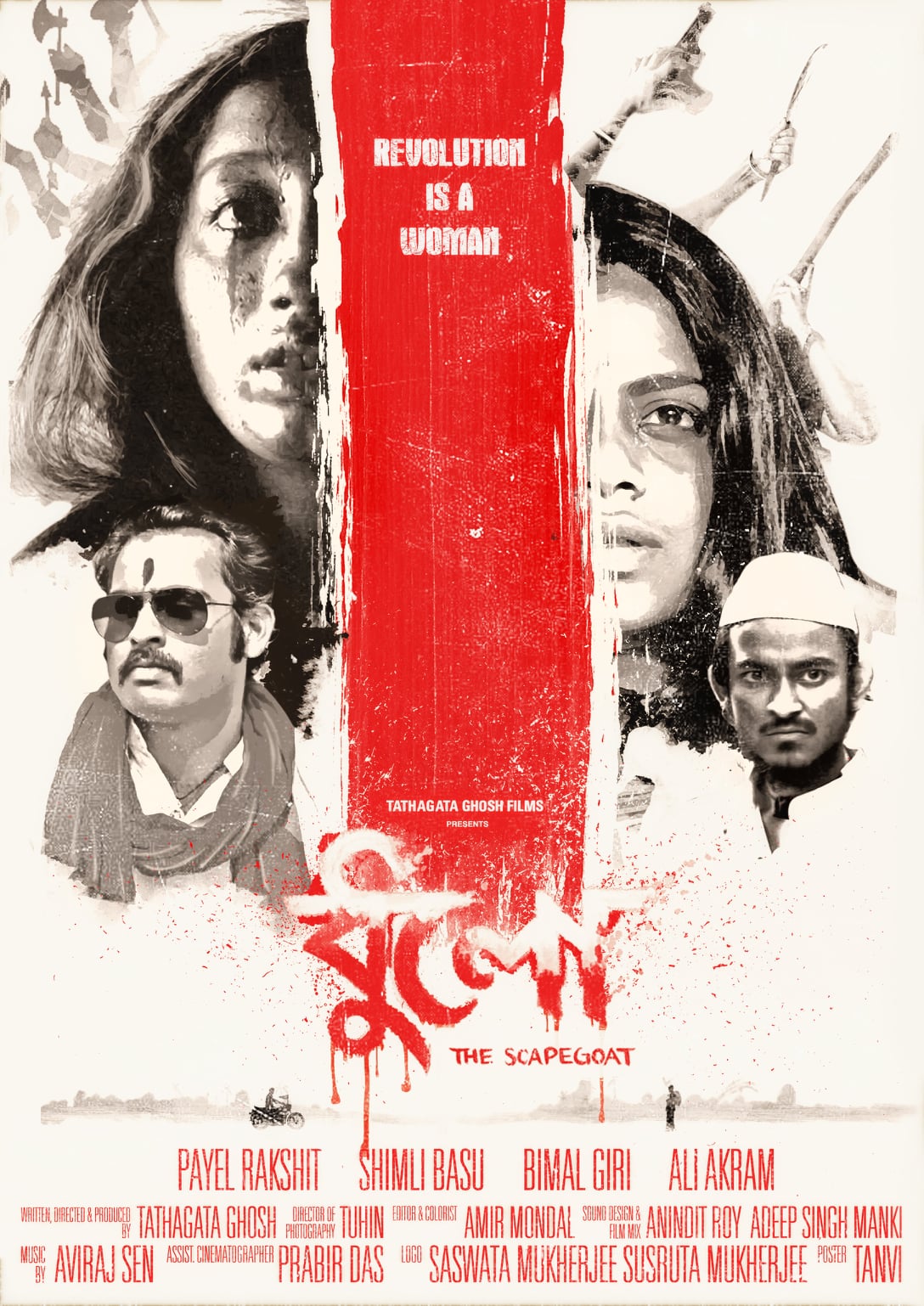
NYC SAFF 2021 Short Film Review “Dhulo (The Scapegoat)”
WATCH THE TRAILER HERE
First, the Recap:
Against the grain. Live long enough in this world and it becomes evident that, ideally, everyone chooses to fall into place and follow their respective, well-established cultural and societal norms, not usually deviating from them enough ever to really cause a stir of any sort. When these norms are, however, so deeply rooted that breaking them is treated as borderline heresy, what consequences will be paid for still deciding to simply stand for what’s right? An isolated village in Bengal sees a Muslim couple, Asif (Ali Akram) and Topu (Shimli Basu), reel from the loss of one of their key sources for survival, already barely getting by as it is. But, when a neighbor named Neeta (Payel Rakshit) makes moves to assist them in their plight, it draws the merciless wrath of her husband Swapan (Bimal Giri), but stokes the fires of rebellion whose outcome may come at a high cost.
Next, my Mind:
One of the consistent underlying elements permeating the film offerings at the 2021 NYC South Asian Film Festival sponsored by Toyota USA and hosted by Festival Director/Jingo Media Founder Jitin Hingorani and Artistic Director Ambica Dev were the myriad of stories that ultimately centered around strong women, women who chose to fully go against India’s highly patriarchal system and show exactly why they needed to be noticed, acknowledged, and seen as capable and equal. Often having to overcome the overt maltreatment, violence, and other abuse that occurs against women in the country, seeing this trend finally getting thrust into the spotlight and the steps being pursued to stop it is inspiring and necessary. With this short film from writer/director/producer Tathagata Ghosh, we are immersed into this world of not only oppression against women, but also the similarly hostile realm of political and religious hate and the potentially deadly ramifications it elicits, paired with the drastic actions to end it that also might arise.
Presenting a narrative focused on two couples from the opposite sides of the religious and political spectrums in a small Bengali village, the circumstances that birth their conflict and the choices that follow candidly paint a portrait of how lost we’ve become when it comes to finding the ability to simply treat each other like human beings, regardless of views or beliefs and even if we disagree, which is pretty clear will be the case at multiple points in our interactions with others. Also, the story likewise delves into just how much rage and unrelenting enmity can be harbored against those of another creed or perspective and then, when the opportunity comes about, take it out on someone of that standpoint just for the sake of releasing the malice and truly nothing more. It’s a harsh, unforgiving mindset that supposedly brings “satisfaction”, but more often than not, only visits retribution back upon the one who perpetrated the troubles.
This is explored on multiple levels through the narrative, but fortunately in the context of said take, does deliver moments of needed, cathartic reckoning and at least a shadow of hope that these kinds of hate-based atrocities depicted, both against women and through hate crimes, will be confronted and ended. Additionally, there are straightforward inspired instances in the film as well, mostly centered on Neeta’s stalwart efforts to be a force of well-being and healing amidst an escalating situation that will alter both her and Topu’s lives forever. Why cycles of violence are ever seen as a solution to often totally solvable disputes that have nothing directly to do with what anyone believes or adheres to is another undercurrent here as well, and one would even hope a film like this will spark the conscious and compel us to consider these points to an extent where being a part of more viable answers to cease needless ideologies that harm and embrace better, more logical ones to see issues resolved, even if it means “tradition” gets upended.
The long and short of it is that the film’s title, which I believe when translated means “injustice”, definitively describes the project’s grander thematic direction and most likely why by the film’s frenetic final act, we get that glimpse of wrongs being righted in the name of persuasive awareness and wholly required shifts in cultural and collective points of view. Akram puts forth a very deliberately understated performance that still finds a way to be equally filled with a quietly fiery air through his role as Asif, a Muslim man faced with a dilemma that unexpectedly puts him in the crosshairs of a neighbor who doesn’t actually appreciate him getting help from them other than to use the situation for their own benefit. As this comes to a head, Asif will find himself at the mercy of absolute misunderstanding and religious fanaticism, from which he may end up facing additional but utterly unnecessary anger towards him. As a man upset but wishing no trouble, Akram does a perfect job at portraying Asif, who just wants to go his own way for the sake of peace.
Giri on the other hand is a highly volatile vessel of unforgiving animosity on several levels through his turn as Swapan, a neighbor who is more than not inclined to assist Asif due to sheer intolerance and prejudice while also treating his own wife with heartless contempt when she wishes to be nothing BUT helpful to Asif and Topu in their time of need. Trying to use Asif and the situation to his own ends, events spiral out of control and soon finds Swapan choosing an extreme course of action whose ripple effect will be felt by everyone involved. This is the kind of character you truly love to hate thanks to the unrestrained coldness and contempt Swapan represents and that Giri does such a fantastic job at embodying throughout the film. What stirs us even more is that, in general, these types of people really do exist in this world, and it really places an angle on this film that impacts you heavily along with the desire to see any form of abject discrimination be put down. Again, this is a total credit to Giri’s intense and believable performance.
That said, the film ultimately belongs to the ladies, beginning with Basu as Asif’s wife Topu, loyal, loving, and fully supportive of her husband even as an unanticipated loss throws questions into their ability to both make a living and just live. Upon accepting assistance from their neighbor’s wife Neeta, Topu is soon to learn a hard lesson in the patriarchal, political, and religiously-driven biases that exist between their respective spouses. In the wake of further tragedy, Topu’s choices become solely pushed by the need for justice, and Basu’s emotional intensity is palpable and grounded in pure, ardent energy and purpose. Likewise, Rakshit delivers a dynamically fervent turn as Swapan’s long-suffering wife Neeta, a kind-hearted soul who only wishes to see a community come together and overcome their hesitancies and differences to just BE unified and available to help each other. As she steps out to do this for Asif and then more and more people in their village, she incurs the hateful and abusive Swapan’s cruelty in return.
Having no recourse but to try and make things right for her and Topu, Neeta’s next steps will involve facing further ridicule and ill treatment in order to maintain her dogged stance and see reparation and judgement delivered. It’s a wince-inducing vulnerability combined with a newly forming and strikingly explosive passion that Rakshit infuses the character with, a testament to Rakshit’s beautifully executed performance. So, in total, “Dhulo (The Scapegoat)” is a another of the weightier offerings from this year’s NYC SAFF but it is not at all frivolous journey into the themes it examines. Rather, it is a blunt reminder of the ongoing aspects of this world that are is such desperate need of correction, and that we finally wake up and realize that TOO much resentment towards others is formed in the name of tradition, culture, religion, and political maneuvering. Time to change, folks, time to change.
As always, this is all for your consideration and comment. Until next time, thank you for reading!



